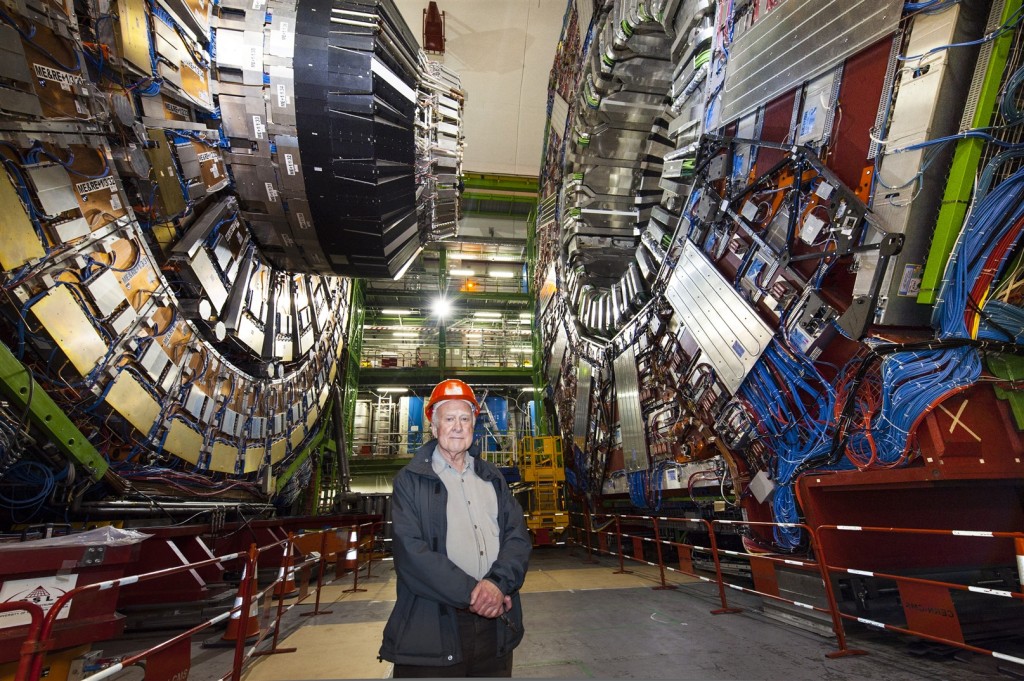 As a teenager I co-authored a book comparing the competing cosmologies in 1968. They were the Big Bang Theory (BBT) and the Steady State Theory (SST). Even though the discovery of the cosmic microwave background (CMB) radiation provided a big boost to big bang theories at that time, I preferred the SST because it had no origin in time. You see, I was an atheist then and I reasoned that if the Universe had no beginning then it didn’t need a Creator and thus I had no God that I needed to obey.
As a teenager I co-authored a book comparing the competing cosmologies in 1968. They were the Big Bang Theory (BBT) and the Steady State Theory (SST). Even though the discovery of the cosmic microwave background (CMB) radiation provided a big boost to big bang theories at that time, I preferred the SST because it had no origin in time. You see, I was an atheist then and I reasoned that if the Universe had no beginning then it didn’t need a Creator and thus I had no God that I needed to obey.
The fact that the BBT has an origin in time—a unique past boundary—has been particularly vexing for the atheist believers in that cosmogony. Using various approaches the BB theorists have been trying to eliminate the beginning, by replacing the Creator with an eternal quantum potential, which existed for eternity past, and then 13.8 billion years ago exploded into the big bang universe, … or, so they say. For now though, they are stuck with the universal origin in a singularity, which in itself has led them to worshipping the Universe itself.
The explanation given in the Bible I now find so much more satisfying. Any cosmogony, which attempts to correctly describe real history, must be consistent with and follow not only the biblical time scale but also follow the sequence of events in the Genesis account. I present a very brief summary of a few biblical creationist models. These models acknowledge the eternal Creator God as the source of everything in the Universe.
An illustrated talk presented at the Creation Ministries International 2016 Creation SuperCamp at The Tops Conference Centre, NSW, 9:45 pm Wednesday January 6, 2016.
Video of Powerpoint presentation
Available on Bitchute.com
This is the sequel to Piercing the ‘Darkness’—The bankruptcy of big-bang thinking and its ‘dark’ fudge factors.
An eternal quantum potential as Powerpoint slides (11.3 MB)
An eternal quantum potential as PDF (1.4 MB)
Related Reading and Viewing
- Piercing the ‘Darkness’ —The bankruptcy of big-bang thinking and its ‘dark’ fudge factors
- An eternal big bang universe
- Starlight and time: Is it a brick wall for biblical creation?
- The Anisotropic Synchrony Convention model as a solution to the creationist starlight-travel-time-problem — PART I
- The Anisotropic Synchrony Convention model as a solution to the creationist starlight-travel-time-problem — PART II
- Cosmology’s Achilles’ heel
- Lemaitre’s cosmology leads back to Rome
- The big bang is pagan philosophy
- Cosmic mythology: Exposing the big bang as philosophy not science
- Cosmology is Not Science
- Big Bang Fudge Factors
- ‘Cosmology is not even astrophysics’
- ‘Dark photons’: Another cosmic fudge factor
- The big bang is not a Reason to Believe!
- On the origin of universes by means of natural selection—or, blinded by big bang blackness
- The singularity—a ‘Dark’ beginning
- Inflation—all in the ‘Dark’
- Is there definitive evidence for an expanding universe?
- Missing cosmic sources elude astrophysicists
- Dark Matter and the Standard Model of particle physics—a search in the ‘Dark’
- Dark radiation in big bang cosmology
- A missing neutrino—Dark radiation
- Expansion of space—a Dark science






7 responses to “An eternal quantum potential or an eternal Creator God”
1.Are you saying that the light from distant stars only arrives on Day 4, so it “appears” that those celestial bodies were created on Day 4, but in reality they were created “x” number of light years earlier in a coordinated way to cause their light to all arrive at the same time?
2.What does “In the beginning….(Gen. 1:1)” refer to? What “beginning”? Day 1 of all creation? OR some time before Day 1 and the creation of light (Gen.1:3)? Were the stars of Gen 1:14, whose light appeared on Day 4, created before the special light of Gen. 1:3 (and the sky, land, seas and plants)? If the latter, then Day 1 of Genesis is not really day 1 of time, but merely Day 1 of a special series of events after the real beginning of time. and there must be a huge time and commentary gap between Gen. 1: 1 and Gen. 1:2.
LikeLike
Firstly I recommend you read my article Starlight and time: Is it a brick wall for biblical creation? particularly the subsection titled “1. A timing convention.”
Also read: The Anisotropic Synchrony Convention model as a solution to the creationist starlight-travel-time-problem — PART I
which is continued in part 2: The Anisotropic Synchrony Convention model as a solution to the creationist starlight-travel-time-problem — PART II
Your question 1: Under the ASC timing convention the light appears for the first time on Day 4, thus all stars and galaxies were created on Day 4. When you say “in reality” it means you have assumed the ESC timing convention as the absolute timing convention for the Universe. That is where the speed of light (c) is assumed to be the same in all directions. Both choices of timing conventions are valid. The real question is which is the convention used in the language of the Bible. But you are essentially correct in the rest, except the notion of what is reality.
Your question 2: Each event in Genesis 1 is marked off by a 24 hour day period of time as measured in Earth (we assume only hypothetical observers on Earth). So Day 1 under ASC is 24 hours long and there is no period before. The events are as Chapter 1 describes. By asking “Were the stars of Gen 1:14, whose light appeared on Day 4, created before the special light of Gen. 1:3 (and the sky, land, seas and plants)?” you are assuming the ESC convention. The whole point of this is to transform our thinking under the ASC convention. Under the ASC convention the answer to you question here is, No! But under the ESC convention the answer is, Yes! Under ASC convention there is no gap between Genesis 1:1 and 1:2. You are assuming the ESC as the absolute timing convention for the Universe to make that assertion.
LikeLiked by 1 person
Just a small thing: in the chart of the mismatch between Genesis and and the Big Bang, “oceans” are listed as the product of Day 2 in the biblical column. But while water is present from the beginning, proper oceans or seas are formed on Day 3, yes? (Gen.1:10). “Sky” or “expanse” is the only thing created on Day 2 according to the text.
LikeLike
But by the Creation account the Earth started as a ball of water. So in comparing it to big bang story, it is on Day 2 where we read of the first instance of a large body of water, under the heavens, distinct from the water in the sky and in space. By God creating the expanse on Day 2 He established the Earth as a massive ocean spinning in space. So I think Day 2 is correct. In the big bang story, the Earth had oceans first without life, i.e. a sterile body of water. The Genesis history only has it empty of life for possibly 1 day (assuming some plants created on Day 3 lived in water) or 3 days (fish created on Day 5), but in the big bang story the oceans remained sterile for millions of years until the life arose spontaneously, as they say. Anyway the minor details are immaterial to the main point—that the sequences do not match.
LikeLike
Dear Dr Hartnett,
I’ve been recently active defending biblical creation in the comments section of science articles on the Internet. However, I am writing to you because I’ve recently began questioning my YEC beliefs and now feel lost in faith and don’t know what to believe. It all happened after I posted a comment about the axis of evil in the CMBR, how the CMBR casts no shadow, how the Big Bang is based on fudge factors like dark energy, dark matter, etc. and how it’s creationists that make actual predictions, like Dr Humphreys, who predicted the magnetic fields of Uranus and Neptune and the diffusion rates from zircons. I got many responses, but one was saying that people like me spread false information or propagate experiments that have been refuted, have had wrong conclusions drawn out of them, are deliberately fraudulent or have not been confirmed by later observations and he challenged me to provide one proof of creationism. I responded by mentioning the RATE helium diffusion data. I wrote that the pressure can only account for 1% error, that an actual age of 1.5 billion years of helium diffusion would only be possible at temperatures of -197 degrees. and contamination can be refuted, since the pressure in the zircons is 200 times in the biotite and there is less helium at higher temperatures, not the other way round, and told him about CreationWiki’s article responding to criticism of the RATE helium diffusion data and Humphrey’s responses to criticism by Dr Kevin Henke. However, I hadn’t really read Kevin Henke’s criticism properly. The response came that Kevin Henke’s refutal is an article containing 47 pages and 19 attatchments, including attatchment C with 81 questions that Humphreys couldn’t or doesn’t want to answer, and Humphreys’ only response was a 4 page article refering to just one of Henke’s arguments. He attatched the following link:
www_talkorigins_org/faqs/helium/zircons.html
This has made me doubt creationism, especially that it was the RATE helium diffusion data that had convinced me of a young Earth in first place. Indeed, this is not the only creationist argument that seems to have been refuted, the same goes for example for the claim that the C 14 level in the atmosphere is not in equillibrium, supposedly proving an Earth less than 30 000 years old, or Keith Davies’ claims that there are not enough supernova remnants for an old Universe, which have been refuted at Talk.Origins.
On the other hand, there is still other evidence of the Bible that doesn’t seem to have been refuted, like C 14 in diamonds. I posted a comment about that, including refutations of critics, such as those who claim the C 14 was created by the decay of radium that comes from the decay of uranium. This is impossible, as that way diamonds would have to be 99% uranium. I got a response saying the C 14 was from cluster decay, but that was the same thing as before, just in different words! (For some reason I couldn’t answer back. My comments didn’t appear on the website.)
Now I really don’t know what to believe. Maybe we’ve been wrong to believe in a 6000 year old Earth? But if so, how come there’s so much more evidence of the Bible? To be honest, I still haven’t looked deeply through Henke’s article, maybe some of it has already been refuted? By the way, I know this is a slightly inconvenient comment, but I hope you won’t block it.
Kind regards,
A young man lost in faith…
LikeLike
Michal,
I am sorry to hear you are having trials of your faith.
Mankind is fallible. Whether he is a YEC believer, and OEC believer or a big bang OEC unbeliever he will make mistakes. As a result, what is claimed as science, even where proof has been established, will sometimes be discarded in another generation. Take phogiston for example. So I think it is a very big mistake to hang your faith on the veracity of any man’s interpretation of any science at all. I am sorry to say but it is wrong-headed.
I will admit though that the modern creation science movement, starting in the USA in the 1960s, had the science first approach. Henry Morris believed initially that he could use science to convince people of the stronger evidence for a biblical creation history for the world. About ten years ago I read a letter he wrote to a friend, where he addressed this issue and in that letter he stated that he was wrong. Science cannot be used to prove the Bible, whatever aspect you like, including a young Earth. Science can only be used to look for evidence consistent with the biblical history. We must first put on our biblical ‘glasses’ so to speak, and observe the world through the perspective afforded us from the Bible. Not the other way round. Because you may end up in a situation like yourself. The initial assumptions we make always determine how we interpret of the evidence. Yes, some theories can be refuted; those which are subject to repeatable experiments done in the present. But generally anything in regards to the past hangs on unprovable assumptions. So it cannot be definitely proven or refuted. And it is not about evidence per se — it is about interpretation of that evidence.
Just remember man is not God. He can’t know everything and he will disappoint you if you hold to the notion that science can answer the fundamental questions of life. It can’t. And that applies to biblical creationists as much as to evolutionary atheists. No one has special knowledge. The past is inaccessible.
I recommend that you read Development of an ‘old’ universe in science. Also How much can you trust in science?, Is belief in God anti-science? and Why believe in God in an Age of Science?.
LikeLike
I watched and listened to your presentation. I have read William L. Craig and Hugh Ross. They both disappoint me. I am 40+ days into my 70th year, having decided for Jesus after graduating from high school in 1964. The topics of your presentation have always intrigued me. Even as a young child, I looked at the world around me and the sky above, having grown up on a farm in deep south Texas, and the natural things surrounding me kept me stable and were stamped in my mind as having been “created” by an intelligent being. I don’t remember not believing that. When I was bombarded by evolution in school, it was not intellectually coherent to me. It took reading the Scriptures to solidify my beliefs and identify the intellect behind the origin of everything.
We don’t want to appear to the people around us as relics of the past with atrophied brains. Young-earth, biblical creationists rely on source documents that are really old, nearly 20 centuries ancient at the youngest. In our incredible, technologically-advanced world of 2016, we live as no one before us. And, yes, we have a desire to be credible, up-to-date in our sophistication, and, in modern parlance, non-Neanderthal in our mind-body comportment. At the same time, as believers committed to Jesus Christ, we want to be faithful to the One who has spoken to us via the written Word.
The sweeping theme over all of time is this. Genesis 1:1 “In the beginning God created the heavens and the earth.” John 1:1-3 “In the beginning was the Word, and the Word was with God, and the Word was God. He was in the beginning with God. All things came into being through Him, and apart from Him nothing came into being that has come into being.” Romans 1:20 “For since the creation of the world His invisible attributes, His eternal power and divine nature, have been clearly seen, being understood through what has been made, so that they are without excuse.” Revelation 4:11 “Worthy are You, our Lord and our God, to receive glory and honor and power; for You created all things, and because of Your will they existed, and were created.”
Oh, how I wish that the body of Jesus Christ could speak with one voice on this! Oh, how I wish that seminaries and Bible colleges and denominations and local congregations could speak with one voice on this! Oh, how I wish that just one church of those that I have attended in several states would have addressed this issue from the pulpit! Oh, how I wish that many authors, who have written great Christian books, would not have capitulated to billions of years and evolution! Oh, how I wish that my sources of discussion regarding Biblical creation were located “in-person” rather than only on the internet!
Thank you for tackling a difficult science issue with respect, courtesy, and whole Bible integrity.
LikeLike